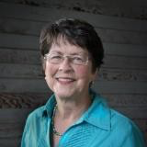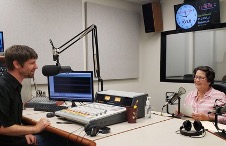Ms. Judith Linsley
Curator of Interpretation and Education, McFaddin-Ward House
Former Adjunct Professor in the Department of History, Lamar University
Former Director, The Center for History & Culture of Southeast Texas & the Upper Gulf Coast
BA in Spanish, Class of 1967. MA in History, Class of 1977
Former Adjunct Professor in the Department of History, Lamar University
Former Director, The Center for History & Culture of Southeast Texas & the Upper Gulf Coast
BA in Spanish, Class of 1967. MA in History, Class of 1977
Interviewed by Vidisha Barua Worley on 04/10/2023


Historian Judith Linsley in the KVLU studios to tape episodes of “2 Minutes of History.” September 2022.
‘I attended Lamar in 1964 and graduated with a Bachelor’s in Spanish in 1967. My parents attended South Park Junior College in the 1920s. They attended, so I always knew about Lamar. My sister also attended Lamar. She matriculated in 1958 and graduated in 1962. I realized that it allowed my parents to get a two-year degree, which was pretty unusual back then. I always felt like it was a good place to go. When I did attend, I felt like it was a good possibility. After I got my undergraduate degree, I went to work in a local office. Ten years later, I went back and got a master’s degree. That is when it really changed my life for what I did for a living. I always felt like I got a good education. It’s always been there when I needed it and was able to provide me with what I needed. So, I am very grateful to it.’
‘Student life in the 1960s was very different. The women were very protected. Lamar College had to know exactly where you lived. You couldn’t just go and live in an apartment like you could now. You had to either live at home or in the dormitories. They wanted to know that you were going to be safe. We did have dormitories and I did stay in the dormitory. It was of course, not as big a college. It was Lamar State College of Technology at that time. Although it was supposed to be a STEM-based college, the liberal arts school was very vibrant and had a lot of students in it. There was actually a Spanish major when I went there, which is not now. So, things have changed. What was really different then was that the women almost always wore dresses to class. The only time we wore pants was when it was really casual or if one of the groups had some kind of an outdoor activity day, we could wear jeans.
‘I was in a sorority. At that time, they were mainly social groups. The friends I made in that sorority are certainly still my closest friends and we still get together. We zoom every month and we actually physically gather.
The actual desegregation activities began in 1956. I was still young and I do not remember much about that. I do know that my brother-in-law was student there at that time. He and some of his friends actually assisted some of the African American students in getting on campus while being harassed. The feeling on campus among the white students who later talked about it was that they had no problem with desegregation. They just wanted the disruption to quit. The disruption was not on campus, it was when they tried to get on campus. When the students tried to attend, they had to cross the picket lines. There was some rough-handling and physical violence by whites against the black students who were coming in. By the time I cam in 1964, we didn’t pay any attention to there being any…I mean we accepted the fact that there were Black students on campus. The social groups were still segregated. Not just Black and White, but other ethnicities as well. I am happy to say that this no longer seems to be true because I get a national publication and they have all groups, African Americans, Asians...’
‘I had some really fine outstanding instructors. Of course, mine were in the Spanish and French Department. There was a Dr. Watson, who was very good and she was a French instructor. That Department at that time was growing. I think they no longer have a foreign language requirement. I don’t know what made the enrollment drop. I went because I majored in Spanish. I love Spanish. I wanted to be a bilingual secretary. At that time, you had have special training. I did not go for teacher certification as my fellow classmates did. They had some very good language instructors, world literature, world history, and American history.’
‘I took Geology instead of Biology. Registration before computers was just painstaking and horrendous. They opened the gymnasium up and they had tables for each school and course. The line for Biology was very long so I went and got in the Geology line. I loved those courses. Not only were the courses interesting, but the teachers were also really fine, interesting people. I never regretted taking that instead of Biology.’